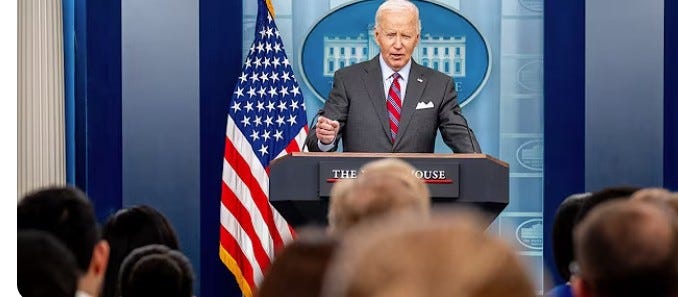It’s a puzzle: Why does providing aid to Ukraine so anger America’s far right? Anger at Moscow was, after all, once its signature issue. Freud argued that the instinct for violence is either directed outward toward an enemy or turned inward, either as repression or a death instinct. The post-World War II GOP took the lead in directing that instinct outward against the USSR, although anticommunism could, through a self-destructive prism, refract some of that animus into the division and madness of McCarthyism. But with the end of the Cold War, no obvious target existed. Saddam Hussein wasn’t an adequate, enduring villain. Without a place to direct rage, it was turned inward against the U.S. itself. The January 6 afternoon rampage—a literal Darkness at Noon moment, a sneer at democracy—is part of that inward aggression.
Why isn’t China an adequate locus of rage? Despite constant dyspepsia over Beijing on Fox News Channel or Tucker Carlson’s latest online venture, not much really changed vis-a-vis China during Donald Trump’s term in office. Sure, there was a more aggressive stance on tariffs, but Sino-American trade remains as enormous and entangled as ever. It is unclear what Trump and his sycophants even think about China’s military moves in the Pacific. Or what do his minions think of North Korea, home of his good friend Kim Jong-Un? Or Taiwan? Joe Biden would more likely defend Taipei than a second-term Trump. China, after all, is where America goes to shop, which makes it an ephemeral villain no more our enemy than Apple or Amazon. Yes, China spies, but nothing so crude as the hacking that Russia has done, and it would be tricky to redirect our country’s id toward our supply chain.
Aid to Ukraine, as Biden and the Democrats have made it, requires a belief in the U.S. or at least a belief in electoral democracy, civility, and our constitution. But that is what the far right attacks. Biden frames support for Ukraine as bolstering democracy over authoritarianism and order versus expansionism. Aid to Ukraine is also an implicit judgment of Trump—the moral equivalent of denouncing January 6 here. And, of course, aid to Ukraine was the casus belli of Trump’s first impeachment when the 45th president threatened to make military aid to Ukraine dependent on Volodymyr Zelensky’s complicity in smearing the Bidens. For Trump and his allies, Kyiv’s comic actor turned wartime hero is a mortal enemy far more dangerous than Hunter Biden Liz Cheney. Zelensky’s integrity and self-sacrifice are antithetical to Trump’s disdain for public purpose. Trump does not even feign any interest other than private interest. Of course, aid to Ukraine is in trouble—it is a defense of democracy in which the Trumpian far right no longer believes.
There should be a debate over aid to Ukraine, but that is not what the GOP seeks. It’s eager to change the subject to migrants getting into the U.S. to poison our blood. The goal of the GOP is to make it impossible for any rational debate on Ukraine to occur.
Meanwhile, in 2023, the working-class rage that the far right has sought to stoke since the era of Richard Nixon and George Wallace has started to head in a different direction. In 2023, with the success of the United Auto Workers strike.
led by the union’s new president, Shawn Fain, the rage turned against the bosses. For Trump, the kind of class-based anger that found an outlet and achieved rational goals in the UAW strike is an existential threat to him and his movement. It makes the ranting about Hillary Clinton and Adam Schiff, and “thugs” and “vermin,” seem like so much sound and fury. Trump’s Detroit rally amidst the strike, an attempt to ride the tiger, showed how ill-equipped he was to try and harness anti-corporate rage. Instead, it was another plea to wallow in self-pity rather than take on employers. That’s just as well. The strike’s success not just in raising wages but in extending the UAW’s reach to the new battery plants and keeping open a plant in Illinois is more tangible in hard money than anything Trump has ever done for his base. It also gives working people power and dignity, an agency that Trump, another boss and a particularly bad one, is incapable of providing. Should that happen, should Fain’s use of working-class rage for a positive end displace Trump’s use of it for his pointless nihilism, then that long-suppressed rage may end up protecting and not subverting the republic.
Until then, the Trumpian right holds Ukraine aid hostage because the war it really wants to fight is at home—on our form of government itself.
Thomas Geoghegan is the author of The History of Democracy Has Yet to Be Written: Why We Need to Learn How to Govern Ourselves All Over Again.











